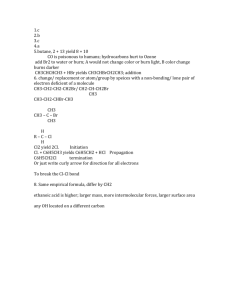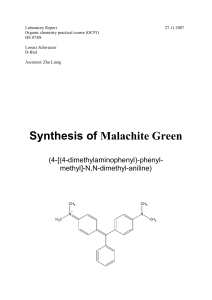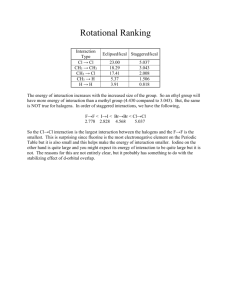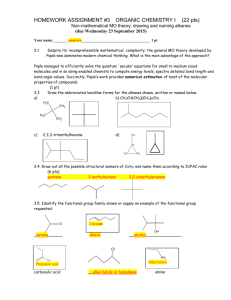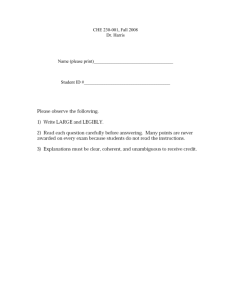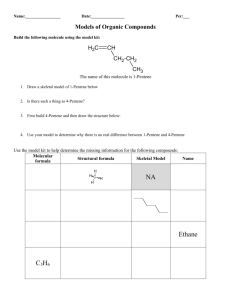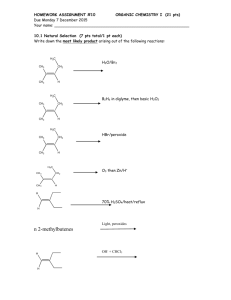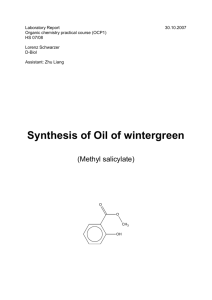Synthesis of
advertisement
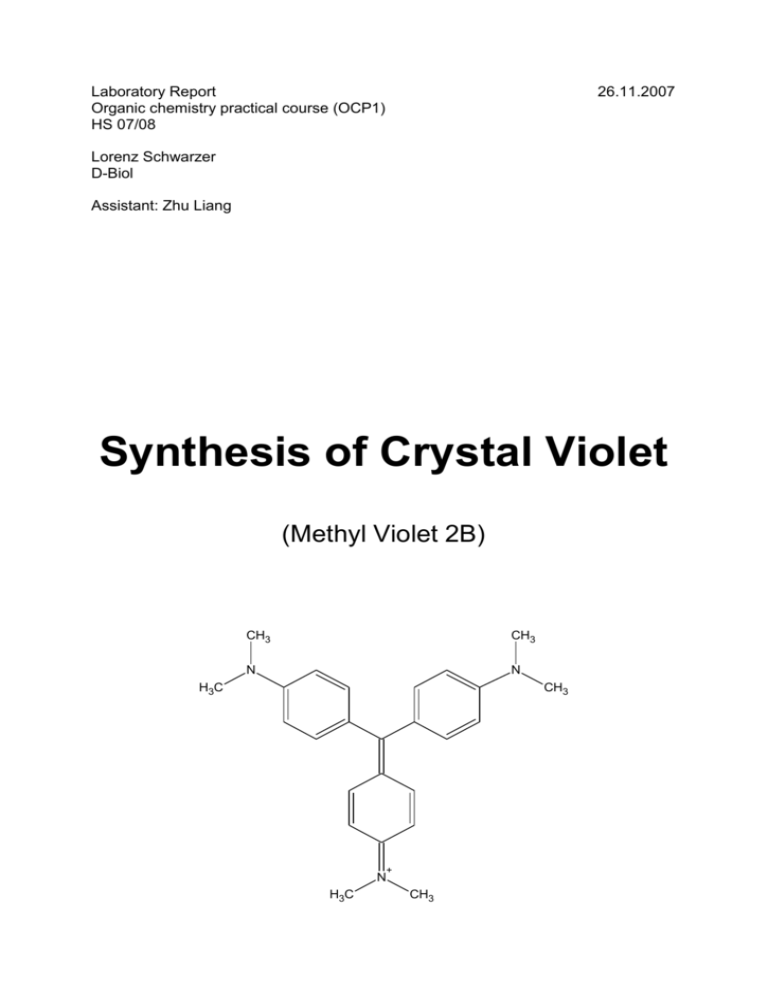
Laboratory Report Organic chemistry practical course (OCP1) HS 07/08 26.11.2007 Lorenz Schwarzer D-Biol Assistant: Zhu Liang Synthesis of Crystal Violet (Methyl Violet 2B) CH3 CH3 N N H3C CH3 + N H3C CH3 Method Addition of Grignard-compounds: Addition of 4-bromo-N,N-dimethylaniline (C8H10BrN) to diethyl carbonate, catalyzed by magnesium. Reaction equation CH3 CH3 N N H3C CH3 O CH3 Br Mg + N H3C O O CH3 CH3 + N H3C (C8H10BrN) diethyl carbonate CH3 crystal violet Mechanism N N Br O Mg O O O O O Br H N MgBr MgBr O O O HgBr Br O N Mg O O O H N N N MgBr O O N N H N H N HN N H N H N N O OH N N N H N N N 2 Physical properties of the substances Magnesium Molar weight Density Melting point Boiling point R-Phrases 24.31 1.74 650 1090 g/mol g/ml °C °C R11 R20 R22 S16 highly flammable Harmful by inhalation Harmful if swallowed keep away from sources of ignition – no smoking S26 In case of contact with eyes, rinse immediately with plenty of water and seek medical advice S33 Take precautionary measures against static discharges S36/37/39 Wear suitable protective clothing, gloves and eye / face protection S-Phrases Mg Tetrahydrofuran THF Molar weight Density Melting point Boiling point R-Phrases O 72.11 0.889 -108.4 66 g/mol g/ml °C °C R11 Highly flammable R19 May form explosive peroxides R36-38 Irritating to eyes and. S16 keep away from sources of ignition – no smoking S29 Do not empty into drains S33 Take precautionary measures against static discharges S-Phrases 4-bromo-N,N-dimethylaniline Molar weight Density CH3 Melting point Br N Boiling point R-Phrases CH R22 R33 - 3 S-Phrases 3 200.08 g/mol - g/ml 54 - 55 °C 264 °C harmful if swallowed Danger of cumulative effects Iodine Molar weight Density Melting point Boiling point R-Phrases 126.90 g/mol 4.93 g/ml 113.7 °C 184.3 °C R21 Harmful in contact with skin R23 Toxic by inhalation R25 Toxic if swallowed R 34 Causes burns S23 Do not breathe vapour S25 Avoid contact with eyes I S-Phrases Diethyl carbonate Molar weight Density Melting point Boiling point R-Phrases O H3C O O CH3 118.13 0.975 -43 126-128 g/mol g/ml °C °C R10 Flammable R36-38 Irritating to eyes, skin and respiratory system S16 keep away from sources of ignition – no smoking S26 In case of contact with eyes, rinse immediately with plenty of water S36 Wear suitable protective clothing S-Phrases Hydrochloric acid (HCl) Molar weight Density Melting point Boiling point R-Phrases H-Cl 36.46 1.19 -40 84 g/mol g/ml °C °C R 34 Causes burns R36-38 Irritating to eyes, skin and respiratory system S 26 In case of contact with eyes, rinse immediately with plenty of water S-Phrases Crystal violet CH3 CH3 N N H3C CH3 Molar weight Density Melting point Boiling point R-Phrases R22 R25 R40 R41 S26 + N H3C CH3 S-Phrases S39 4 407.88 g/mol - g/ml Decomposes (ca. 140-215) °C °C harmful if swallowed Toxic if swallowed Limited evidence of a carcinogenic effect Risk of damage to the eyes In case of contact with eyes, rinse immediately with plenty of water Wear eye / face protection Educts Substance Amount Magnesium 4-bromo-N,Ndimethylaniline Diethyl carbonate Molar amount Volume g 0.32 2.03 mol 0.013 0.010 ml 0.18 - 0.20 0.0017 0.21 Experimental accomplishment 1. Into a 250 ml flask (rinsed before with some THF), 0.32 g magnesium, 18 ml THF, 2.03 g 4-bromo-N,N-dimethylaniline and one crystal iodine were added. The solution became green. 2. It was heated gently under reflux for 30 min. The colour changed to browngreen. And then cooled down to room temperature. 3. 0.20 g diethyl carbonate in 2 ml THF (in one portion) was added and heated again to reflux for 5 min. Then cooled down to room Temperature. 4. Slowly 6 ml of aqueous HCl (10 % solution) was added. 5. A piece of cotton was coloured by the crystal violet. But with soap it was possible to wash out the colour. 6. The water was evaporated, a plastic violet mass with metal shine originated. 7. The mass was dried in the oven and the IR and the melting point were measured. It was not possible to measure the yield, because the crystal violet was very hard and clinged to the bottom of the flask. Experimental setup Thermometer Reflux condenser Thermometer Condenser Vacuum Oilbath 4 3 21 5 67 8 11 9 4 3 2 1 5 67 8 9 1 0 Heating Apparatus 4 3 21 5 67 8 11 9 4 3 2 1 5 67 8 9 1 0 Distillation Apparatus 5 Results Melting point: Taken: Crystal violet (lit.): 4-bromo-N,Ndimethylaniline (lit.): IR-Spectrum-bands [cm-1] 159°C ca. 140-215°C 54 - 55°C 1580 1514.57 1354.46 1296.26 1164.25 1059.54 C-C in-ring C-C in-ring C-H rock C-N stretch C-N stretch C-N stretch (aromatics) (aromatics) (alkanes) (aromatic amines) (aliphatic amines) (aliphatic amines) With the aid of the interpretation of the IR-spectrum, the product can be identified as a molecule with aromatic rings and amines. But it’s not possible to distinguish clearly between 4-bromo-N,N-dimethylaniline and crystal violet, because there are no different bounds which could be measured. But with the taken melting point, the product can be identified as crystal violet, because the melting point of 4-bromo-N,N-dimethylaniline is much lower. IR-Spectrum of the Product 6 Reference IR-spectrum of crystal violet Literature Script Organic chemistry II, Prof. Dr. Hans-Jürg Borschberg, ETH Zürich Table of Characteristic IR Absorptions http://riodb01.ibase.aist.go.jp/sdbs/cgi-bin/cre_index.cgi?lang=eng http://en.wikipedia.org http://www.discoverygate.com http://physchem.ox.ac.uk/MSDS/#R%20and%20S 7
